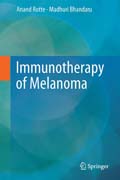
Metastatic melanoma are introduced to the readers, giving details of the diagnosis, clinical symptoms, types and AJCC staging, followed by a discussion of problems in the treatment of melanoma and how immunotherapy provided the solution. Next an account of the immune system is given, describing its role in cancer prevention and discussing how immune check points are circumvented in cancer. Approved drugs are discussed together with their molecular mechanisms of action, response rates, survival benefits, pharmacokinetics and adverse effects. Finally this book discusses the most promising candidates from ongoing clinical trials and highlights challenges faced by immunotherapeutic drugs as well as strategies to overcome them.
Metastatic melanoma is a deadly type of skin cancer, known for its resistance to conventional treatments. For decades, patients were managed with a handful of drugs that had minimal survival benefits. The scenario changed with the approval of inhibitors of BrafV600E and MEK, and monoclonal antibodies against CTLA4. While the kinase inhibitors were promising in the initial studies, they suffered with the development of lethal resistance. Anti-CTLA4 monoclonal antibodies (Ipilimumab) on the other hand provided long term survival benefits in responding patients and there were no reports of resistance. However, response rate for Ipilimumab was very low. Recently, monoclonal antibodies against PD-1 receptors (Nivolumab, Pembrolizumab) were approved by FDA for the treatment of melanoma, extending the hope for melanoma patients. This book provides detailed information on immunotherapeutic drugs for melanoma management - it describes melanoma, discusses issues in melanoma treatment and highlights the successes of immunotherapy in the treatment.
- ISBN: 978-3-319-48065-7
- Editorial: Springer
- Encuadernacion: Cartoné
- Páginas: 480
- Fecha Publicación: 06/01/2017
- Nº Volúmenes: 1
- Idioma: Inglés
